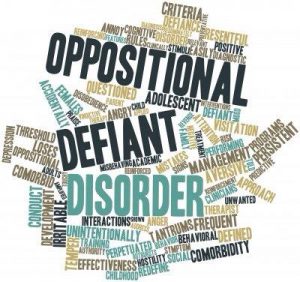Oppositional Defiant Disorder and characteristics of the disorder will be seen in most children at some stage of their development. It becomes a problem when the criteria do not resolve naturally and problems intensify.
If your child has been diagnosed with ODD it means they exhibit the majority or at least four of the following criteria under the Diagnostic and Statistical Manual of Mental Health Disorders for at least six months:
- often spiteful and vindictive to parents, teachers, adults and siblings
- will deliberately annoy and provoke people to extreme
- often loses their temper
- will continually and often refuse and defy requests and rules from adults
- will argue with adults too the extreme (I often see this with clients who display a God like complex where you cannot negotiate an argument with them)
- is consistently angry and often resentful
- will blame others for their mistakes and behaviours while knowingly understand the other person is not at fault
- often annoyed by others very quickly, agitated and touchy
As I said, I am sure you have seen parts of the criteria in your child at some stage and this is normal. It becomes a problem when it doesn’t stop.
Today’s Tip
One client I worked was a 12 year old boy where his parents had recently divorced. He continually played each parent off against each other, which is a typical problem faced by many parents even without ODD thrown in the mix. He would not comply with any instruction and had an answer for everything, would destroy his other siblings property, blame everything on his parents and sibling leaving both parents at a loss to know what to do.
Divorce and separation often creates huge tension and chaos in children’s lives and this is where the parents need to set aside their differences for the sake of their child as in this case the child was seeking structure so he had to make his own by controlling the situation. The following steps are not easy and you as a parent need to work on knowing the focus must be on your child.
- Boundaries – no matter how you feel about your ex spouse you need to develop the same rules in both households. Even if you only have your child once a fortnight on the weekend. If you don’t the child will not understand that although you have separated you still ‘respect’ each other enough to enforce the same rules. Basically what I’m saying is if ‘Billy’ has been defiant all week then having a completely ‘fun’ weekend destroys everything the other parent is trying to accomplish with having rules.
- Use the same behaviour plan and expectations at both homes. Creating stability reinforces a ‘safe’ environment for them which us what they are craving.
- Don’t be the couple that let your child see the screaming matches. You are only sending them the message that thus is the way an adult relationship works. This is not an easy one but remember it’s about the child, not you.
- Your child is confused about what’s happening. They often want to fix the problems in your relationship so you will be a family again. Another client who’s parents had been separated for 14 years still believed at 16 years of age she could repair her parents marriage. Speak honestly and age appropriately to your child about what is happening.
- If you are willing, the best thing you can do for your child with ODD is to have counselling with the sole focus on how to work together as parents.
- The big one – NEVER manipulate your child with ‘It’s your Dad’s fault that I don’t see you’ Or ‘It’s your mothers fault that we don’t have the money to buy things’. It is not your child’s fault you have separated although it may have been a factor it was still an adult decision. Putting them in the middle of a bitter divorce will only intensify their behaviour.
- ODD is not something that is caused from bad parenting. It’s a culmination of factors and the good news is with intervention and proper assistance you will see a change in behaviour over a period of time if you remain focused on your child and learn to understand why your child is behaving the way they are.
Many parents are scared and frightened to seek help for their child for fear of criticism of their parenting, but as I say to my parents you are not given a handout on what parenting is meant to be. There are many types of parenting and all have a valid place. Getting an outside perspective gives you the strategies to apply in your homes to make your child’s world a better place, not just for them but for your whole family.

